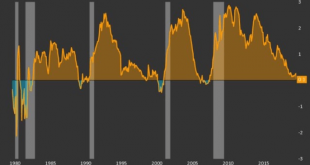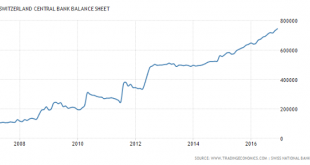We’ve recently seen a lot of coverage and even more “expert analyses” on the state of the bond market, to the extent that the average investor, or the average citizen for that matter, is likely to be overwhelmed and very confused about what it all means. Experts from the institutional side and defenders of the current monetary direction argue that it is all the result of policy choices, that’s it’s all under control and that we really shouldn’t worry about the extreme phenomena and...
Read More »Redenomination Risk in the Eurozone
In a CEPR discussion paper Christian Bayer, Chi Kim, Alexander Kriwoluzky analyze redenomination risk during the European debt crisis and how the European Central Bank’s interventions affected this risk. They conclude that the risk fell in the case of Italy but increased for France and Germany. From the abstract: … first estimate daily default-risk-free yield curves for French, German, and Italian bonds that can be redenominated and for bonds that cannot. Then, we extract the compensation...
Read More »The Secret History Of The Banking Crisis
Accounts of the financial crisis leave out the story of the secretive deals between banks that kept the show on the road. How long can the system be propped up for? - Click to enlarge It is a decade since the first tremors of what would become the Great Financial Crisis began to convulse global markets. Across the world from China and South Korea, to Ukraine, Greece, Brexit Britain and Trump’s America it has shaken...
Read More »“Makroökonomie hat nicht versagt (It’s Not Macroeconomics That Let Us Down),” FuW, 2017
Finanz und Wirtschaft, August 2, 2017. PDF. Macroeconomists are neither forecasters nor economic policy makers. They devise models. Economic policy makers are in charge of applying them.
Read More »Sornette’s Supercomputer Is Betting On A Market Crash
Via FinancialSense.com, One of the world's most powerful supercomputers, retrofitted for trading the stock market, appears to be betting on a crash in the months ahead. The Financial Crisis Observatory (FCO) at ETH Zurich released its latest Global Bubble Status Report on July 1st. As we discussed with FCO’s director, Didier Sornette, on our podcast in May, they use one of the world’s leading supercomputers to monitor global markets each day for two distinct bubble-like...
Read More »UBS Business Solutions AG
In the NZZ, Hansueli Schöchli reports about further steps by UBS, the Swiss bank, to prepare for the next financial crisis. In the future, a legally independent service unit—UBS Business Solutions AG—provides other business units with critical internal services, including payments, trading systems as well as legal services. A “Master Service Agreement” specifies that the service unit remains operative even if other business units fail. Die UBS vollzieht nun einen weiteren Schritt. Sie...
Read More »Macroeconomic Effects of Bank Solvency vs. Liquidity
In a CEPR discussion paper, Òscar Jordà, Björn Richter, Moritz Schularick, and Alan M. Taylor suggest that higher bank capital ratios help stabilize the financial system ex post but not ex ante, and that illiquidity breeds fragility. Abstract of their paper: Higher capital ratios are unlikely to prevent a financial crisis. This is empirically true both for the entire history of advanced economies between 1870 and 2013 and for the post-WW2 period, and holds both within and between...
Read More »Deposit Outflows from Greek Banks, Again
In the FT, Mehreen Khan reports about the resurgence of deposit flight.
Read More »“Secular” Stagnation, A Return to Trend
On Bank Underground, Gene Kindberg-Hanlon criticizes the secular stagnation hypothesis: Real interest rates have fallen by around 5 percentage points since the 1980s. Many economists attribute this to “secular” trends such as a structural slowdown in global growth, changing demographics and a fall in the relative price of capital goods which will hold equilibrium rates low for a decade or more (Eggertsson et al., Summers, Rachel and Smith, and IMF). In this blog post, I argue this...
Read More »The VIX Will Be Over 100 due to Central Bank Created Tail Risk
By EconMatters We discuss the manner in which Central Banks have destroyed financial markets, and have the stage for what I label as the Red Swan Event in this video. When the Swiss National Bank holds risky Tech stocks in its portfolio, we are in unchartered territory! We had the Financial Crisis of 2008, and instead of learning from the mistakes of incentivizing excessive risk taking, the Central Banks were allowed to...
Read More » Swiss Economicblogs.org
Swiss Economicblogs.org




